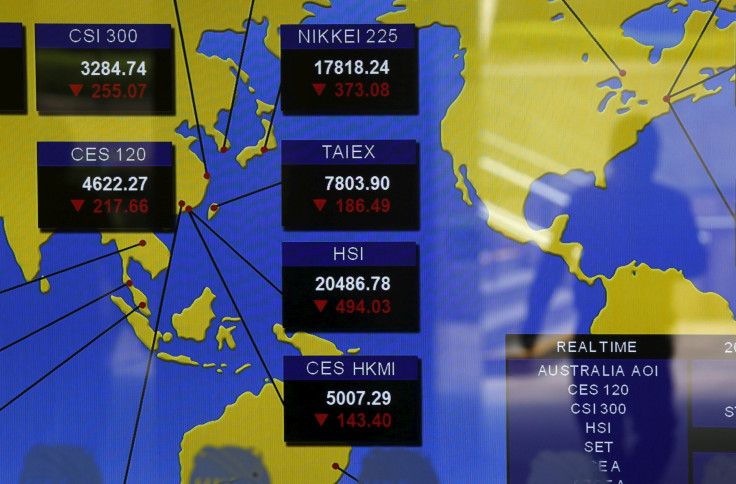Global Stocks, Oil Prices Plummet As Chinese Markets Remain Volatile

Fears over global growth, triggered by signs of fresh weakness in the Chinese economy, have once again led a steep plunge in stocks and commodities worldwide. On Thursday, amid further turmoil in the Chinese stock market, where trading was halted for the day after shares fell more than 7 percent for the second time this week, oil prices dropped to levels not seen in over 11 years.
The price of Brent crude oil fell over 5 percent to $32.16 a barrel — a level not seen since April 2004 — before edging back to $33.35. West Texas Intermediate, the U.S. benchmark, fell as much as $1.87 to $32.10 a barrel, the lowest intraday level since December 2003.
According to analysts cited by Bloomberg, the price of Brent oil is expected to fall further and hit $30 a barrel in the next 10 days.
“The market trades on greed and fear, and right now fear dominates greed,” Gordon Kwan, a Hong Kong-based analyst at Nomura Holdings, told Bloomberg. “Commodity futures markets are always forward looking, and they fear that the depreciation of the yuan foreshadows further weakness in the Chinese economy.”
Additionally, a huge oversupply of oil caused by near-record output levels also dragged on prices, hurting companies and countries that rely heavily on oil revenues. In Saudi Arabia — the world’s largest producer of oil — the benchmark Tadawul All Shares Index dropped nearly 4 percent at the open Thursday.
Global stocks also have been hit hard by concerns over the health of Chinese economy. These worries were further amplified Thursday after the People’s Bank of China’s move to weaken the yuan sparked a selloff in Chinese stocks and triggered a “circuit breaker” that forced the country’s stock markets to shut in the first 30 minutes of trading.
Investors remained worried that the yuan’s rapid depreciation could mean that the world’s second-largest economy is even weaker than previously imagined.
“Markets are nervous — in essence they don’t trust the policy makers in China,” George Boubouras, chief investment officer at Contango Asset Management in Melbourne, told Bloomberg. “Investors don’t like the concept of a fast-depreciating yuan, so there’s a lack of confidence.”
European markets opened in the red again Thursday, echoing overnight performance by their Asian counterparts, while U.S. stock futures tumbled over 2.5 percent, hinting at another turbulent day of trading in American markets.
The pan-European Stoxx 600 was down over 3.5 percent, while the U.K.’s FTSE 100 dropped 2.8 percent during early trade. France’s CAC 40 and Germany’s DAX index also fell over 3.3 percent, as investors mulled over the impact of China’s economic turmoil on the eurozone economies.
© Copyright IBTimes 2024. All rights reserved.






















